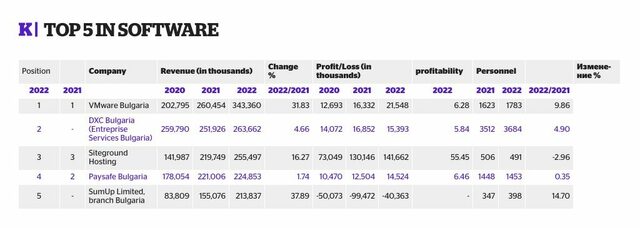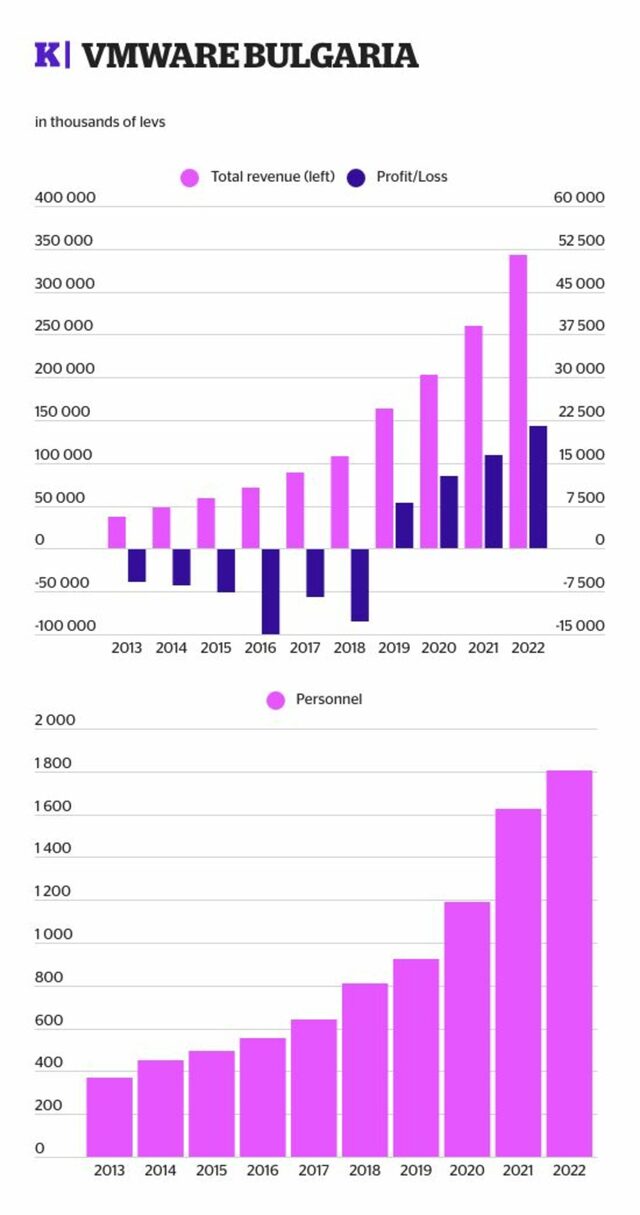Business logic dictates that the growth of the largest companies in a given sector is rarely impressive. Mature companies are more conservative and face a very natural glass ceiling. Traditional business logic clearly does not apply to the Bulgarian software sector, however. Although there are already software giants in the country, and the industry has been complaining about a shortage of personnel for a decade now, the growth of the largest Bulgarian technology companies is, to say the least, impressive.

Among the top 50 companies in the ranking, there are only four that have seen their revenues shrink in recent years. In three of them, these are modest corrections, but in the fourth (Tryond) there is a collapse of more than 70%. The average growth of all companies is close to 18%, with the highest growth topping 50%.
All this is good news because it means that the largest Bulgarian software companies, which are also the largest employers in the sector, entered 2023 in good shape. At the beginning of that year, news of huge layoffs among global technology giants raised fears of layoffs in Bulgaria as well. So far, however, it seems that the only thing that has decreased is the demand for software engineers, which has always been significantly higher than the supply anyway.
At the top: quadrupling VMware
The largest software company remains the Bulgarian branch of the American VMware. In 2022, the revenues of the company marked an impressive jump of 31.8% to 343.3 million levs, making it not only the largest company that year, but also the largest software company in the corporate history of Bulgaria. The profit for the period was 21.5 million levs, logically the largest in the ranking.

Seen in context, VMware's expansion in Bulgaria looks even more impressive. Just a few years earlier, in 2017, revenues were 89 million levs. Since then the company has grown almost fourfold - a growth that is much more suited to a startup than the largest software company in a country with a relatively well-developed IT sector.
The top seven: Siteground and the Bulgarian branches of foreign companies
The remaining four places in the top five were occupied almost entirely by Bulgarian branches of foreign companies - the exception was Siteground, the Bulgarian hosting company founded by Tenko Nikolov and Ivo Tsenov.
In second place that year came DXC Bulgaria, and a number of clarifications are needed here. DXC Bulgaria is the successor of the long-standing leader in the K100 outsourcing ranking, Enterprise Services Bulgaria. The group deals with a variety of activities - from software, IT infrastructure support, business process outsourcing and project management. The company was formed seven years ago after the merger of Hewlett-Packard Enterprise and Computer Sciences Corp., which created the DXC Technology group. Revenues for 2022 jumped by more than 4% to 263 million levs. Employee numbers also grew, and are already over 3,700, making it the largest employer in the ranking.
Third place went to Siteground, which in 2022 grew by more than 16% in terms of revenue, up to 255.4 million levs. By tradition, Siteground has an impressive profit - 141.6 million levs, or over 55% margin. The number of employees, however, shrank slightly from 506 to 491 people by the end of 2022.
Ranking fourth was Paysafe Bulgaria, the Bulgarian branch of the fintech company Paysafe. Its revenues in 2022 grew minimally to 224.8 million levs. "In 2022, we implemented major improvements in the usability of digital wallets, related to account creation and many new crypto trading functionalities. We can say that, despite the global crises, we are satisfied with the results and the way our teams in Bulgaria and in our other locations are developing," said the company.
Fifth place went to SumUp Limited, branch Bulgaria, the Bulgarian division of the payment company SumUp. Its revenues grew to 218 million levs, compared to 155 million levs a year earlier - a growth of 37%. There was also an increase in the number of employees. By the end of 2022, there were close to 400, compared to 347 a year earlier. The Bulgarian company operates at an impressive loss of 40 million levs, and in 2021 it was more than twice as high - 99 million levs.
Outside of the top five, sixth position went to SAP Labs Bulgaria, one of the two companies of the German software giant SAP in Bulgaria. SAP Labs is specifically responsible for product development, employing 1,343 workers in the local branch at the end of 2022. Over the course of that year, the company's revenues grew by 27.3% to 196.8 million levs, a jump of more than 40 million levs in revenue compared to a year earlier.
The top 7 closes with the consolidated revenues of Atos Bulgaria, the branch of the French software company Atos. Two Atos companies operate in Bulgaria - Atos Bulgaria Competence Center and Atos IT Solutions and Services. In 2022, the total revenues of the two companies reached 161 million levs, an impressive jump of almost 35% compared to a year earlier. These revenues were split almost equally between the two legal entities. There was also a jump in the number of employees, as within a year Atos had hired more than 200 people in Bulgaria.
Who grows fastest?
The ranking continues with Experian Bulgaria and Progress Software, the Bulgarian companies of Experian and Progress, respectively. "2022 was a successful year for the entire business of Progress. We expanded our network of clients, providing them with the tools and support they need to make their business successful," commented Simeon Stoychev, vice president at Progress.
Further down in the rankings are some of the biggest success stories. The public company listed on the stock exchange Sirma Group Holding, which was in eighth position and the highest placed all-Bulgarian company, grew by more than 25% to 81.1 million levs. The growth of Nemechek, which raised its revenues by 25.8%, was similar, rising to 35.8 million levs in 2022.
The record holders for growth over the year were Dreamix, Acronis Bulgaria and Mentormate. The Bulgarian Dreamix recorded a jump in revenues of more than 67%, up to 23.7 million levs. It is this impressive growth that puts the company in the ranking. Just two years earlier, Dreamix's revenue had been 8 million levs, i.e. it has achieved threefold growth within two years. Along with the increase in income, there was also an increase in the number of employed people, which at the end of 2022 stood at 169 compared to 120 a year earlier.
The revenues of the Bulgarian branch of the cybersecurity company Acronis grew by 52.5% to 80.7 million levs, as a year earlier they were 52.9 million, and in 2020 - 34.8 million. Over the course of the year the company had hired another 50 people, and by the end of 2022 the number of employees stood at 505.
Mentormate, which is based in the USA, but hosts most of its employees in Bulgaria, saw similar results. Its growth was exactly 50% compared to a year earlier, with revenues reaching 68.3 million levs for 2022. In this period, the company also hired more than 100 new employees, reaching a team of 767 people.
Musala Soft, the Bulgarian company, acquired by the Czech technology holding Qinshift in 2020, also reported impressive growth. Revenues for the year grew by 31.4% to 60.9 million levs, while the number of employees increased by 20 people to 447.
"The combination of long-term stable portfolio formation and luck saved us from the strong turbulence that has hit the global economy and the IT sector in particular since the end of 2022. We are not completely unaffected, but we managed to compensate for the shocks towards the middle of 2023. We are currently within the planned growth and we expect 20% growth for the year," Elena Marinova, president and chairman of the board of Musala Soft, commented.
Increases of 36%, 39% and 36% respectively were reported by KPMG IT Service, Bosch.IO and Fadata. For Fadata, which develops software for the insurance sector, the shake-up is welcome after a period of stagnation. Its revenues grew to 27.2 million levs.
Peace of mind and good image
2022 saw a significant reduction in complaints about the lack of qualified personnel. The likely reason is not that they magically appeared out of nowhere, but rather that concerns of a global recession dominated the start of the year. Some companies reduced their number of employees, others cut the number of open positions, while others completely froze hiring new people.
This was the case with Acronis. Plamen Toshev says that in 2022 the company made the decision to reduce the hiring of new employees, so that there would be no layoffs in 2023. Yet he expected to switch to accelerated hiring of specialists again and adds that people are already being sought, mostly from outside the country.
The explanation for layoffs globally, and in some cases locally, was that software companies have been hiring massively since the pandemic, but at some point it turned out that there simply wasn't enough work for many of the new hires. At the same time, it allowed companies that were not so well positioned during the pandemic to hire some of those laid off. In other words, it's not about going from staff-hungry to hungry programmers without a job.
In 2022 there was a new complaint among managers, although not often cited directly: the unsettled political situation - the lack of a regular government and parliament together with the overall feeling of a lack of strategy in terms of investment and education, upon which economic development depends.
This political uncertainty has been partly remedied at the time of writing, although long-term stability is still in question.
Business logic dictates that the growth of the largest companies in a given sector is rarely impressive. Mature companies are more conservative and face a very natural glass ceiling. Traditional business logic clearly does not apply to the Bulgarian software sector, however. Although there are already software giants in the country, and the industry has been complaining about a shortage of personnel for a decade now, the growth of the largest Bulgarian technology companies is, to say the least, impressive.













